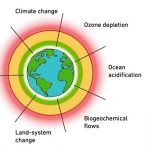How dark matter could be measured in the solar system
Pictures of the Milky Way show billions of stars arranged in a spiral pattern radiating out from the center, with illuminated gas in between.
But...
Almost all common chemicals on Earth aren’t sustainable, shows study
More than 99% of the most widely produced chemicals aren’t sustainable, research finds.
In addition, their production is based on fossil raw materials and consumes...
Giant mountains across supercontinents controlled the evolution of life on Earth
Giant mountain ranges at least as high as the Himalayas and stretching up to 8,000 kilometers across entire supercontinents played a crucial role in...
Scientists find a ‘one-off gift’ from Martian meteorite
Scientists find the first evidence of high-intensity damage caused by asteroid impact from a Martian meteorite.
The new finding has implications for understanding when conditions...
Scientists find Goldilocks Zone for precious metals in Earth’s crust
Leicester research has identified a new ‘Goldilocks Zone’ in the Earth’s crust which could provide metals vital to the green revolution.
The energy future of...
Be brave like a tiger: Lunar New Year explained
"Everyone should be reminded to be brave like a tiger this year."
That's the sage advice of a young China studies scholar at The Australian...
Scientists find locations of ancient Maya sacred groves of cacao trees
For as much as modern society worships chocolate, cacao — the plant chocolate comes from — was believed to be even more divine to...
Tug of sun, moon could be driving tectonic plate motions on Earth
A new study suggests that imbalanced forces and torques in the Earth-moon-sun system are behind movement of tectonic plates.
The new analysis provides an alternative...
Economists forecast impact of inflation, interest rates and instability in 2022
In 2021, the United States faced several profound challenges: another year of a global pandemic, governmental instability and gridlock, supply-chain issues, high inflation, and...
Five trends that will reshape our lives in 2022 and beyond
Even a global pandemic cannot slow the acceleration of new technologies and evolving technologies that has become the disruptive norm of our lives over...










